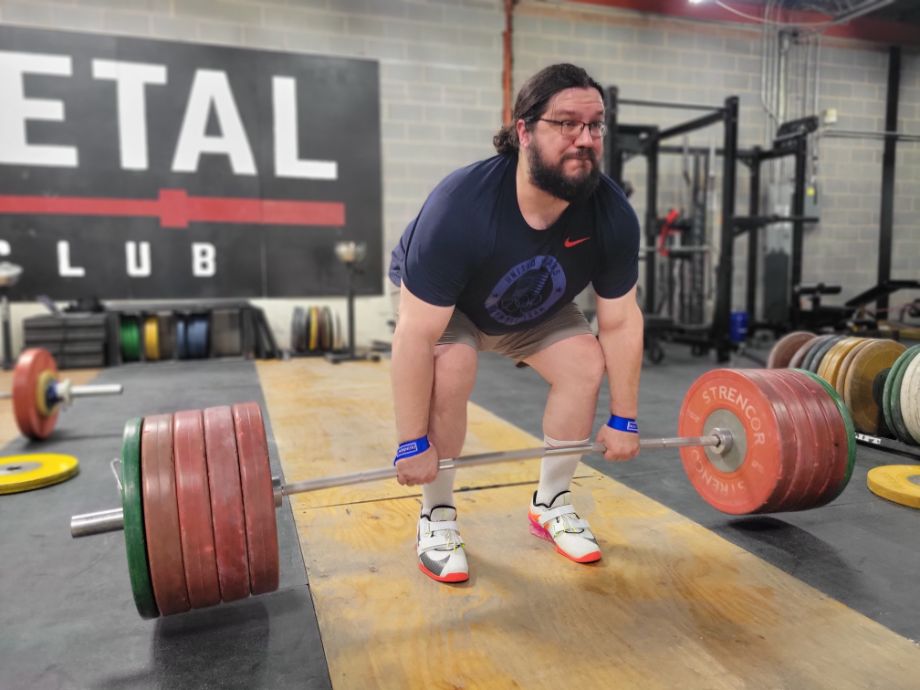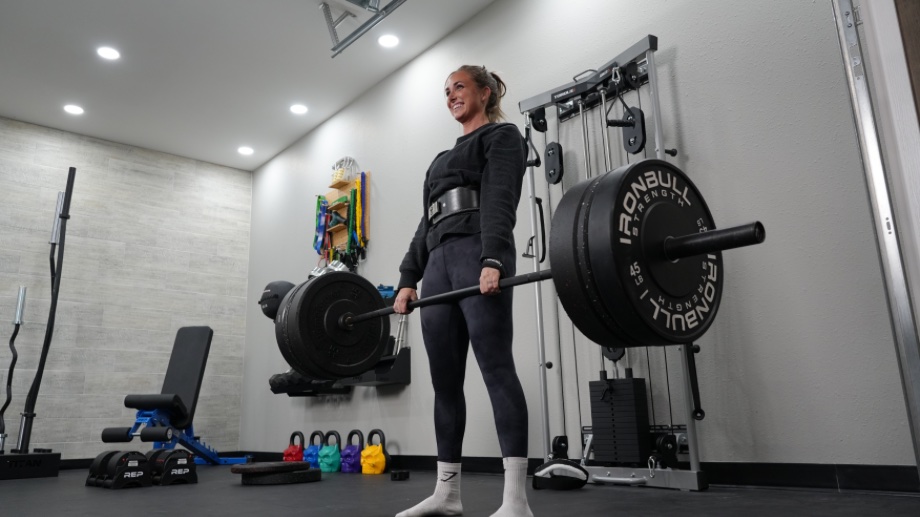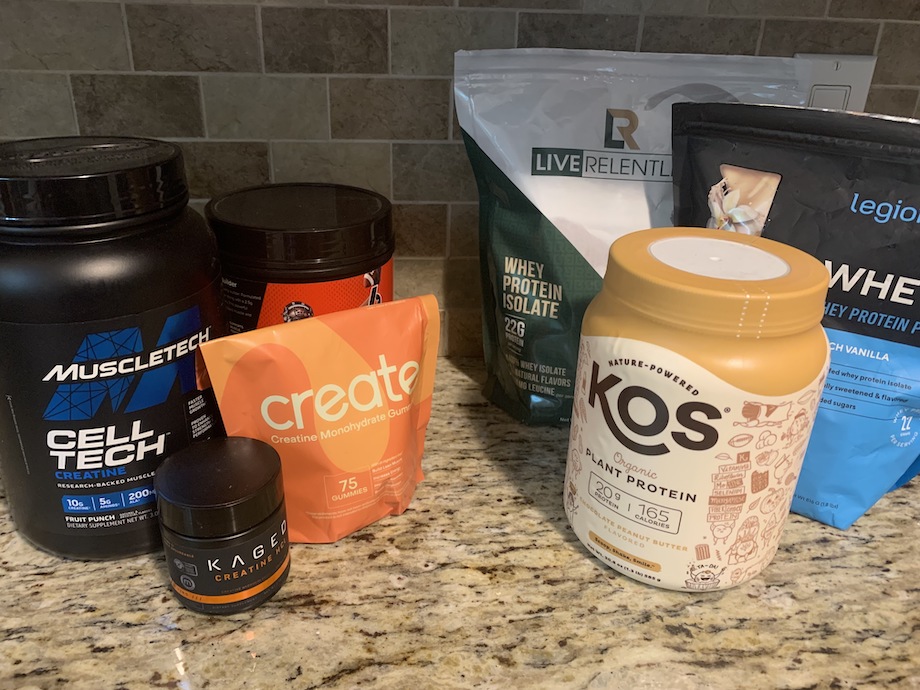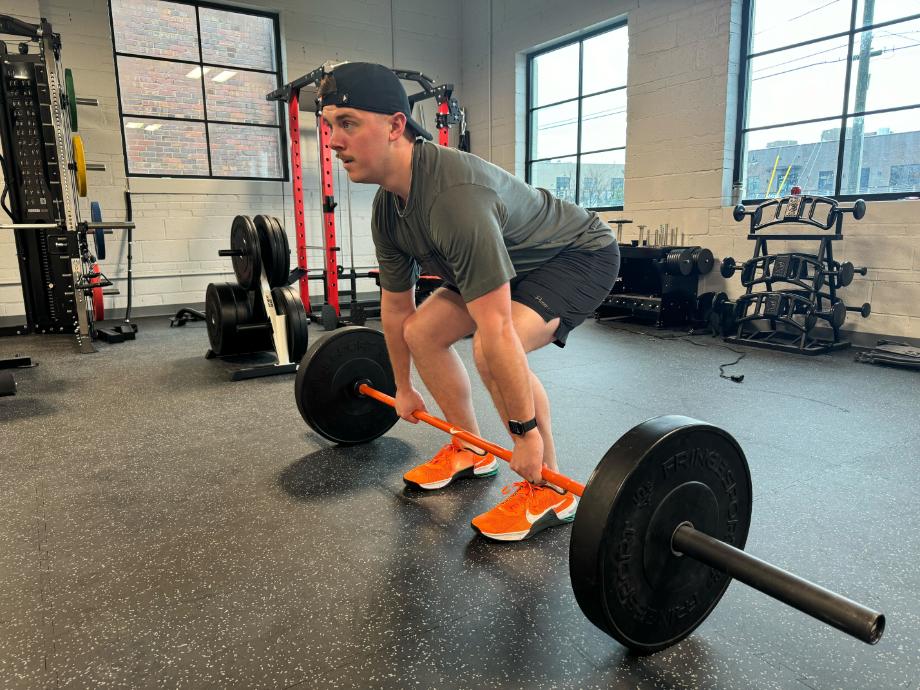We test and review fitness products based on an independent, multi-point methodology. If you use our links to purchase something, we may earn a commission. Read our disclosures.
If you’re looking to maximize your muscle gains and break through training plateaus, German volume training (GVT) might be the ideal solution. Renowned for its intense and high-volume approach, GVT—aka the 10-sets method—has earned a reputation as one of the most effective mass-building programs.
RELATED: How Many Reps To Build Muscle
As a certified personal trainer (CPT) with nearly two decades of weightlifting experience, I’ll break down everything you need to know about this unique training method. From exploring its origins to examining its benefits to identifying common mistakes, this comprehensive GVT guide provides the knowledge and tools to structure your workouts for optimal results. Additionally, I’ll cover the importance of nutrition and supplementation to support your training and recovery.
So, if you’re mentally prepared to pump out more reps than ever, get your pre-workout ready, warm up your arms and shoulders, and let’s dive right in.
What Is German Volume Training?
German volume training is a high-volume, high-intensity training method designed to maximize your muscle hypertrophy and strength gains. The core principle of GVT involves performing 10 sets of 10 reps for a primary exercise, targeting a specific body part or muscle group. This training method focuses on compound lifts such as the barbell row, bench press, or deadlift, which engages multiple muscle groups and promotes overall muscle growth.
RELATED: Complete Guide To Compound Exercises

GVT rose to prominence during the ‘70s thanks to Rolf Feser, a weightlifting coach for the German national team. He implemented this high-rep protocol to help his athletes achieve superior muscle growth during the offseason.
Renowned strength coach Charles Poliquin further popularized GVT in the late ‘90s by introducing it to a broader audience through his writings and training programs. Poliquin’s adaptation of GVT emphasized the importance of using compound exercises and maintaining strict form and controlled tempo, which has since made it a staple in bodybuilding and strength training circles.
Sample German Volume Training Program
The foundation of the 10-sets method lies in compound exercises, which recruit multiple muscle groups simultaneously, making them highly effective for building overall strength and muscle mass. However, given the demanding nature of German volume training, you will only perform three workouts over five days, allowing for adequate recovery time. You will repeat that cycle six times for a 30-day program.
Intermediate and advanced lifters can utilize GTV to break through plateaus and take their physiques to the next level. Beginners can also follow this program to pack on muscle. However, inexperienced lifters should start with light weights and focus on form.

Each workout consists of four exercises separated into two supersets. You will perform the “A” exercise for 10 sets of 10 at 60% of your one-rep max, taking 60 to 90 seconds of rest between sets. After you complete both “A” exercises, you will move on to the “B” exercises. This superset will feature less volume (three sets of 10 to 20 reps). Supersets not only increase the overall intensity and efficiency of the workout but they also allow you to train agonist-antagonist muscle groups (ie. chest and back).
Chest and Back
| Exercise | Sets | Reps | Rest |
| 1A: Barbell Bench Press | 10 | 10 | 60-90 sec. |
| 2A: Barbell Bent-Over Row | 10 | 10 | 60-90 sec. |
| 1B: Incline Cable Fly | 3 | 12-15 | 60 sec. |
| 2B: Lat Pulldown | 3 | 12-15 | 60 sec. |
Legs and Core
| Exercise | Sets | Reps | Rest |
| 1A: Barbell Back Squat | 10 | 10 | 60-90 sec. |
| 2A: Romanian Deadlift | 10 | 10 | 60-90 sec. |
| 1B: Lateral Lunge | 3 | 12-15 | 60 sec. |
| 2B: Hanging Leg Raise | 3 | 12-15 | 60 sec. |
Arms and Shoulders
| Exercise | Sets | Reps | Rest |
| 1A: Military Press | 10 | 10 | 60-90 sec. |
| 2A: Parallel Bar Dip | 10 | 10 | 60-90 sec. |
| 1B: Seated Dumbbell Lateral Raise | 3 | 12-15 | 60 sec. |
| 2B: Cable Overhead Triceps Extension | 3 | 12-15 | 60 sec. |
Benefits Of German Volume Training
From breaking through training plateaus to improving overall muscular endurance, GVT can transform your fitness regimen in several impactful ways.
Enhances Muscle Hypertrophy
GVT’s high-volume approach induces significant hypertrophy by maximizing your time under tension and the metabolic stress on your muscles. A 2019 study1 on resistance training volume found that higher training volumes led to greater gains, suggesting a dose-response relationship between the number of repetitions and the amount of muscle mass you can pack on.
RELATED: Hypertrophy Workout 101: How To Guarantee Muscle Growth
Improves Muscular Endurance
Based on the concept of 10 sets of 10 reps, the repetitive nature of GVT helps improve endurance by pushing your muscles to their limits. While strength training involves heavier loads (typically around 80% of your one-rep max) and less volume (about one to five reps per set), this protocol takes the opposite approach.

A 2021 Sports (Basel) study2 on loading recommendations for muscle strength, hypertrophy, and endurance showed that a high-repetition scheme with light loads (15+ repetitions per set with loads below 60% of your one-rep max) optimizes local muscular endurance improvements. That aligns with GVT standards, where you typically work with a load of around 50% to 60% of your one-rep max.
Can Help You Break Through Plateaus
Even as an experienced lifter, I’m the first to admit it’s easy to fall into the trap of doing the same types of workouts. However, that can often lead to diminishing returns—especially if you’re not changing variables like load, tempo, or rest time. GVT’s high-volume and high-intensity approach is an excellent way to break through training plateaus, as it will force you to adapt to a much different rep scheme.
RELATED: How and Why To Do Tempo Training
Common GVT Mistakes And How to Avoid Them
While German volume training can be highly effective for building muscle and strength, it’s also easy to make mistakes that can hinder your progress or even lead to injury. Here are common mistakes people make with this strength training protocol—and how to avoid them.
Using Too Much Weight
Starting with a weight that’s too heavy can lead to poor form and an increased risk of injury. To avoid this and ensure you complete the requisite number of reps, choose a load that’s about 50% to 60% of your one-rep max. As you progress with your training plan and develop more muscle strength and stamina, then you can use heavier weights.
RELATED: How To Lift Heavier
Insufficient Rest Periods
GVT relies on strict rest periods to maintain the intensity of the workout. Taking shorter or longer rests than recommended (60 to 90 seconds) can affect your performance and recovery. Use a timer to stick to the prescribed rest intervals, which will help you maintain the right intensity and optimize your muscle growth.
Not Progressing
To keep making gains, it’s important to progressively overload your muscles by gradually increasing the weight or intensity of your workouts. Sticking with the same weight for too long can lead to stagnation. Regularly assess your performance and increase the weight when you can complete all sets with good form, ensuring continuous muscle adaptation and growth.
RELATED: What Is Progressive Overload?
Neglecting Proper Form
With the high volume of repetitions, it’s easy to let your form slip as you fatigue. This can lead to less effective workouts and increase your chance of injury. Whether you’re working on a close-grip bench press or a front squat, focus on maintaining proper form throughout each set, even if it means reducing the weight.
Ignoring Recovery
Given the intensity of GVT, your muscles need adequate time to recover. Ignoring recovery can lead to overtraining, which hampers muscle growth and increases injury risk. Allow sufficient rest between your GVT sessions, get enough sleep, and incorporate active recovery techniques such as stretching and foam rolling.

RELATED: What Is Active Recovery?
The Importance Of Nutrition For Maximizing GVT Gains
Proper nutrition fuels your workouts and supports muscle growth, repair, and recovery. Here, I’ll discuss the importance of protein intake, complementary supplements, and overall dietary considerations to make the most out of your GVT program.
Protein for Muscle Growth and Repair
During a German volume training workout, your muscles undergo significant stress and microtears, which you must repair for strength and size. Consuming adequate protein ensures that your body has the necessary amino acids to support this process.
- Daily protein intake: Aim to consume 1.6 to 2.2 grams of protein3 per kilogram of body weight per day. This range can vary depending on your training intensity, goals, and overall activity level.
- Protein sources: Incorporate a variety of protein sources such as lean meats, poultry, fish, and eggs. This variety ensures you get a complete profile of essential amino acids.
- Timing: Spread your protein intake evenly throughout the day, including post-workout, to maximize muscle protein synthesis4. A protein-rich meal or shake within 30 minutes after your GVT session can enhance recovery and muscle growth.
RELATED: Plant Protein Vs Animal Protein
Supplements for Performance And Recovery
In addition to a well-balanced, protein-rich diet, certain supplements can support your performance and recovery during German volume training.

- Creatine: Creatine is one of the most researched and effective supplements for enhancing strength, power, and muscle mass. It helps replenish ATP (adenosine triphosphate) stores, providing energy for high-intensity exercises like those in GVT. A daily dose of 3 to 5 grams of creatine monohydrate can improve performance and support muscle growth5.
- Branched-chain amino acids (BCAAs): BCAAs (leucine, isoleucine, and valine) can help reduce muscle soreness and accelerate recovery. Consuming BCAAs before or during your workout may decrease muscle protein breakdown and support muscle repair6.
- Protein supplements: Whey protein is a convenient and effective way to boost your daily protein intake, especially post-workout. It is quickly absorbed and contains all essential amino acids necessary for muscle recovery and growth.
RELATED: 8 Whey Protein Benefits
German Volume Training: Final Thoughts
In the quest for maximum gains, German volume training stands out as a tried-and-true weight training method that can deliver impressive results. By embracing the high-volume, high-intensity approach of GVT, you’re not just lifting weights—you’re sculpting a powerful physique. Stick to the protocol, avoid common pitfalls, and fuel your body properly, and you’ll be well on your way to achieving the muscular frame you’ve always dreamed of.
German Volume Training: FAQs
What is German volume training good for?
German volume training is excellent for building muscle mass, increasing strength, and breaking through training plateaus due to its high-volume, high-intensity approach.
Can GVT be a suitable training program while losing fat during a cut for an experienced lifter?
Yes, GVT can be effective during a cut for experienced lifters, as the high volume can help preserve muscle mass while promoting fat loss, provided that nutrition and recovery are properly managed.
Can beginners do German volume training?
Can beginners do German volume training?
Beginners can do German volume training, but they should start with lighter weights and focus on mastering proper form before gradually increasing the intensity.
What’s the recommended rest period between sets in German volume training?
The recommended rest period between sets in German volume training is typically 60 to 90 seconds.
References
- Schoenfeld, B.J., Contreras, B., Krieger, J., Grgic, J., Delcastillo, K., Belliard, R., & Alto, A. (2019). Resistance Training Volume Enhances Muscle Hypertrophy but Not Strength in Trained Men. Medicine and Science in Sports and Exercise, 51(1), 94-103. https://doi.org/10.1249/MSS.0000000000001764
- Schoenfeld, B. J., Grgic, J., Van Every, D. W., & Plotkin, D. L. (2021). Loading Recommendations for Muscle Strength, Hypertrophy, and Local Endurance: A Re-Examination of the Repetition Continuum. Sports, 9(2). https://doi.org/10.3390/sports9020032
- Stokes, T., Hector, A. J., Morton, R. W., McGlory, C., & Phillips, S. M. (2018). Recent Perspectives Regarding the Role of Dietary Protein for the Promotion of Muscle Hypertrophy with Resistance Exercise Training. Nutrients, 10(2). https://doi.org/10.3390/nu10020180
- Atherton, P. J., & Smith, K. (2012). Muscle protein synthesis in response to nutrition and exercise. The Journal of Physiology, 590(Pt 5), 1049-1057. https://doi.org/10.1113/jphysiol.2011.225003
- Kreider, R. B., Kalman, D. S., Antonio, J., Ziegenfuss, T. N., Wildman, R., Collins, R., Candow, D. G., Kleiner, S. M., Almada, A. L., & Lopez, H. L. (2017). International Society of Sports Nutrition position stand: Safety and efficacy of creatine supplementation in exercise, sport, and medicine. Journal of the International Society of Sports Nutrition, 14. https://doi.org/10.1186/s12970-017-0173-z
- Kaspy, M. S., Hannaian, S. J., Bell, Z. W., & Churchward-Venne, T. A. (2023). The effects of branched-chain amino acids on muscle protein synthesis, muscle protein breakdown and associated molecular signalling responses in humans: an update. Nutrition research reviews, 1–14. Advance online publication. https://doi.org/10.1017/S0954422423000197
Further reading

HawkGrips are IASTM tools that are made of stainless steel and some of the best available. They're high-quality, incredibly useful, and beautiful. We highly recommend them to practitioners and people that like nice bodywork tools. Read more

The Rep Fitness Equalizer Iron Platesare some of the best value weight plates currently available. Featuring a machined center hole, sandblasted and then machined surface, and symmetrical grip holes, these plates are a great value. If you're in the market for a good steel plate at a low price, these are one of the best options currently available. Read more

The best workout leggings are moisture-wicking, breathable, and stretchy enough to comfortably move with you. Here are our top picks. Read more

The Marrs Bar is a safety squat bar with a unique camber. Our Marrs-Bar safety squat bar review tells you why this speciality bar is, well, so special. Read more

